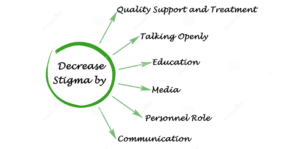It seems the biggest obstacle to stopping drinking (or using drugs) is still based in shame and stigma. Broadly the shame appears to be along the line of thinking that suggests if we have a problem we should be able to solve it ourselves, so if we can’t we try to hide the problem rather than accepting and asking for help. Problems arise as a result, shame at the inability to deal with our own issues compound and breed more shame. The stigma is simple enough, no matter how many people say “it’s a disease”, or “it’s a brain issue” or whatever other explanation is currently in vogue (result of trauma) the most common image of the drunk, or the addict, is either pathetic or debauched, and that image culturally reinforced for centuries and retrieved from deep ingrained memory creates a response of, at worst revulsion, at best pity.
A couple of years ago The Fix, one of the top websites about addiction and recovery, ran a forum question “Do celebrities have a responsibility to come out of the sober closet?” Whatever our own opinions about celebrity culture there is no doubt that marketers and advertisers certainly think (and always have) that it is worth paying a wide variety of their preferred profiled personalities from pop music, sport, film, online and in wider, and indeed narrower, product niches, So it must help them. Newspapers, websites, magazines and TV programmes solicit the opinions of culture kings and queens on issues from climate change, #MeToo, political campaigns and every topic of the day, whether expert or not, so it must help them. Charities enlist the support of celebrity to publicise and fund raise because it works, it helps them.
So supporting the idea of recovery could help a lot of others, and if we have found recovery who would not want that? The obvious caveat though, it generates shame and stigma from others so any kudos from exposing it can be a double edged sword.
Celebrity or not, many people who find recovery struggle with the idea of disclosure for a variety of reasons, but it has huge advantages.
One of the best recent examples in the UK comes from Jack Monroe. Jack is a British food writer, journalist and activist whose own story was inspiring enough before she disclosed her alcoholism in a column in The Observer in January 2019. Self described as a mea culpa, it looked a lot like an acknowledgement of powerlessness over alcohol, and an unmanageable life – honest and not a little painful, shared about as openly as The Observer’s circulation and Jack’s profile allowed. In The Observer’s last issue of 2019 Jack’s back celebrating a year of recovery!
“And I did need to tell people. Because in my line of work there are always invitations, open bars, long nights and swanky clubs you can slip into if you know the right B-lister and are considered worthy of their company. Coming out publicly was difficult, and damaged some of my friendships and strained some family relationships, but I did it to be held accountable. And for the most part, it worked.” (Read the full article here)
Recovery is a truly subjective personal experience, and the choices we make in life are equally our own, there is no moral imperative to share aspects of your life, unless those are your moral choices. But disclosing might well help our own recovery.
Of course the “anonymity” issue always comes in to play here, although it has no need to. The question is simply are you are an “influencer”? It can only help others if you are willing to share your experience – you don’t have to mention any particular group or method, although if you wished to even that can be done without too much harm*, and in disclosure we will almost certainly help in some way.
Every one’s life is their own, it is an individual choice – many high profile individuals openly share their past struggles, others refer to it without shame but choose not to focus on it.
It would be more helpful if more teachers, students, doctor’s, policemen, politicians, journalists and people in every other field who are in recovery, their families and their friends, were willing to share the differences in their lives – smashing the shame and destroying the stigma.
Disclosure can help, it can help the individual and it can give encouragement to others. Occasionally the argument about public relapses damaging recovery raise their heads, largely this can be seen as a red herring – relapse happens, the truth about addiction is not always a comfortable thing.
One year sober and singing the changes, the differences Jack Monroe is a brave, honest and thoroughly decent individual – congratulations, you disclosed and it helps.
*Please read Faces and Voices Of Recovery UK (FAVORUK) Advocacy With Anonymity – How to share your story of recovery without effecting anonymity
Jack Monroe’s latest book Tin Can Cook is published by Pan Macmillan





